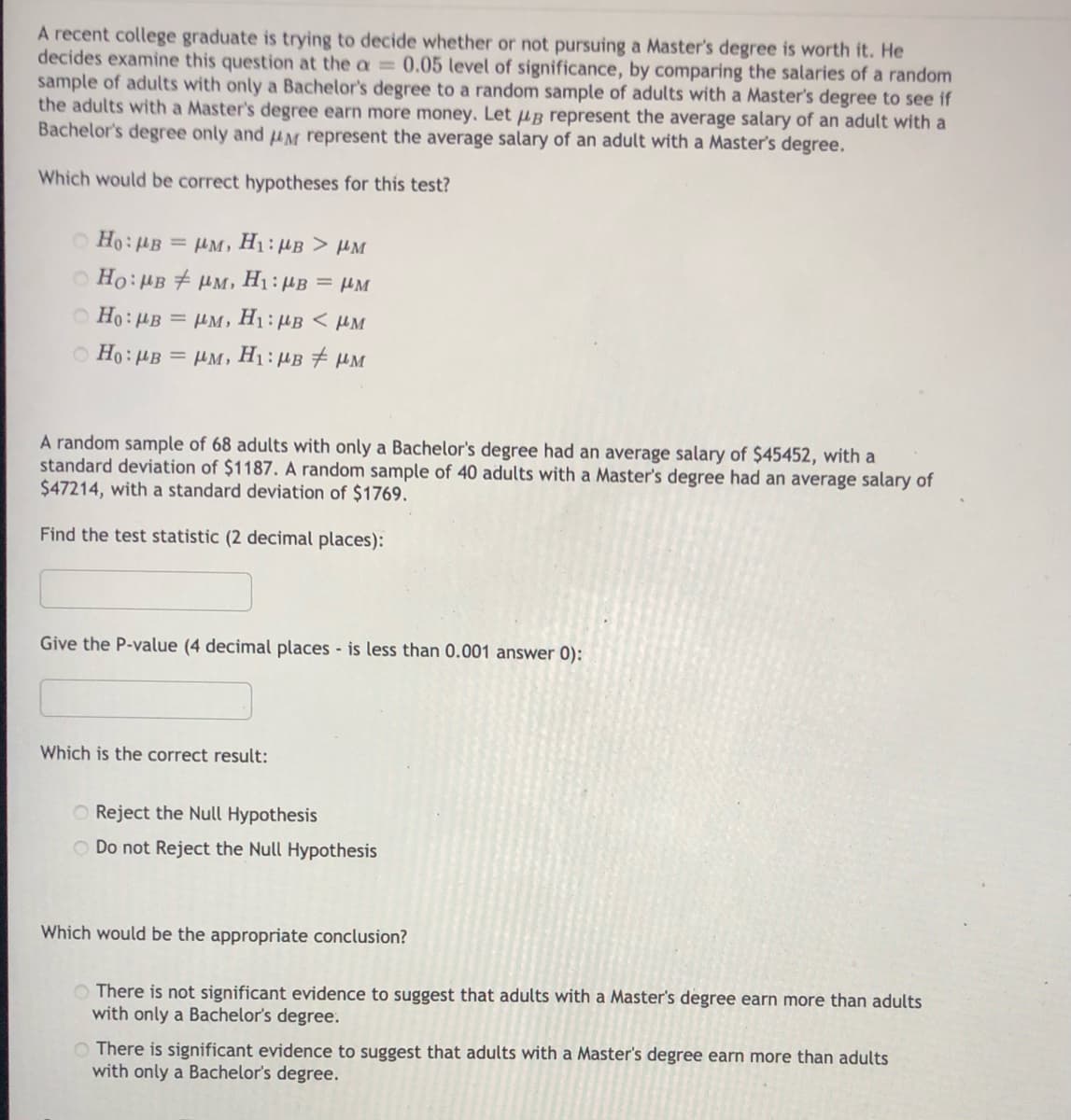A recent college graduate is trying to decide whether or not pursuing a Master's degree is worth it. He decides examine this question at the a 0.05 level of significance, by comparing the salaries of a random sample of adults with only a Bachelor's degree to a random sample of adults with a Master's degree to see if the adults with a Master's degree earn more money. Let uB represent the average salary of an adult with a Bachelor's degree only and uM represent the average salary of an adult with a Master's degree. Which would be correct hypotheses for this test? O Ho: HB = UM, H1: µB > HM O Ho: HB # HM, H1: µB = µM O Ho: HB = µM, H1:HB < HM O Ho: HB = HM, H1:HB # HM A random sample of 68 standard deviation of $1187. A random sample of 40 adults with a Master's degree had an average salary of $47214, with a standard deviation of $1769. dults with only a Bachelor's degree had an average salary of $45452, with a Find the test statistic (2 decimal places): Give the P-value (4 decimal places - is less than 0.001 answer 0): Which is the correct result: O Reject the Null Hypothesis O Do not Reject the Null Hypothesis Which would be the appropriate conclusion? O There is not significant evidence to suggest that adults with a Master's degree earn more than adults with only a Bachelor's degree. O There is significant evidence to suggest that adults with a Master's degree earn more than adults with only a Bachelor's degree.
A recent college graduate is trying to decide whether or not pursuing a Master's degree is worth it. He decides examine this question at the a 0.05 level of significance, by comparing the salaries of a random sample of adults with only a Bachelor's degree to a random sample of adults with a Master's degree to see if the adults with a Master's degree earn more money. Let uB represent the average salary of an adult with a Bachelor's degree only and uM represent the average salary of an adult with a Master's degree. Which would be correct hypotheses for this test? O Ho: HB = UM, H1: µB > HM O Ho: HB # HM, H1: µB = µM O Ho: HB = µM, H1:HB < HM O Ho: HB = HM, H1:HB # HM A random sample of 68 standard deviation of $1187. A random sample of 40 adults with a Master's degree had an average salary of $47214, with a standard deviation of $1769. dults with only a Bachelor's degree had an average salary of $45452, with a Find the test statistic (2 decimal places): Give the P-value (4 decimal places - is less than 0.001 answer 0): Which is the correct result: O Reject the Null Hypothesis O Do not Reject the Null Hypothesis Which would be the appropriate conclusion? O There is not significant evidence to suggest that adults with a Master's degree earn more than adults with only a Bachelor's degree. O There is significant evidence to suggest that adults with a Master's degree earn more than adults with only a Bachelor's degree.
Holt Mcdougal Larson Pre-algebra: Student Edition 2012
1st Edition
ISBN:9780547587776
Author:HOLT MCDOUGAL
Publisher:HOLT MCDOUGAL
Chapter11: Data Analysis And Probability
Section: Chapter Questions
Problem 8CR
Related questions
Topic Video
Question

Transcribed Image Text:A recent college graduate is trying to decide whether or not pursuing a Master's degree is worth it. He
decides examine this question at the a 0.05 level of significance, by comparing the salaries of a random
sample of adults with only a Bachelor's degree to a random sample of adults with a Master's degree to see if
the adults with a Master's degree earn more money. Let uB represent the average salary of an adult with a
Bachelor's degree only and uM represent the average salary of an adult with a Master's degree.
Which would be correct hypotheses for this test?
O Ho: HB = M, H1: HB > µM
O Ho:HB µM, H1 : µB = µM
O Ho: HB
= HM, H1: HB < µM
O Ho: HB = µM, H1: HB # UM
A random sample of 68 adults with only a Bachelor's degree had an average salary of $45452, with a
standard deviation of $1187. A random sample of 40 adults with a Master's degree had an average salary of
$47214, with a standard deviation of $1769.
Find the test statistic (2 decimal places):
Give the P-value (4 decimal places - is less than 0.001 answer 0):
Which is the correct result:
O Reject the Null Hypothesis
O Do not Reject the Null Hypothesis
Which would be the appropriate conclusion?
O There is not significant evidence to suggest that adults with a Master's degree earn more than adults
with only a Bachelor's degree.
O There is significant evidence to suggest that adults with a Master's degree earn more than adults
with only a Bachelor's degree.
Expert Solution
This question has been solved!
Explore an expertly crafted, step-by-step solution for a thorough understanding of key concepts.
This is a popular solution!
Trending now
This is a popular solution!
Step by step
Solved in 3 steps with 1 images

Knowledge Booster
Learn more about
Need a deep-dive on the concept behind this application? Look no further. Learn more about this topic, statistics and related others by exploring similar questions and additional content below.Recommended textbooks for you

Holt Mcdougal Larson Pre-algebra: Student Edition…
Algebra
ISBN:
9780547587776
Author:
HOLT MCDOUGAL
Publisher:
HOLT MCDOUGAL

Holt Mcdougal Larson Pre-algebra: Student Edition…
Algebra
ISBN:
9780547587776
Author:
HOLT MCDOUGAL
Publisher:
HOLT MCDOUGAL